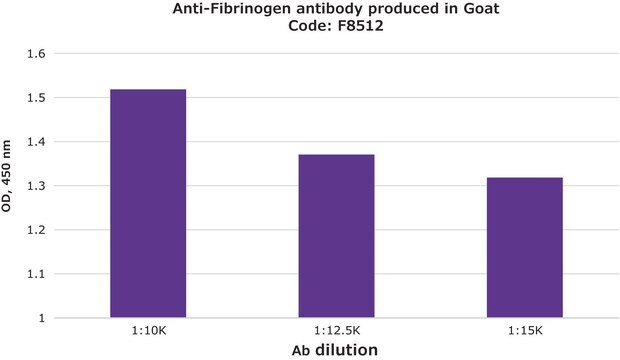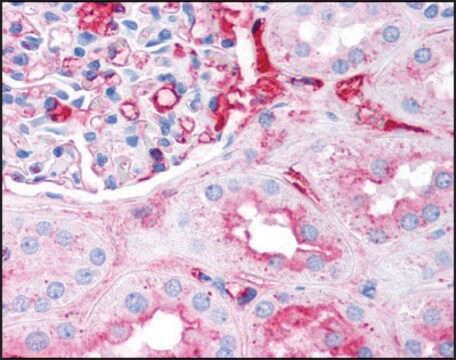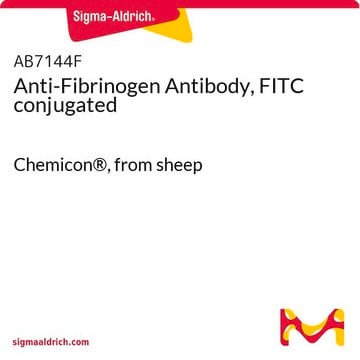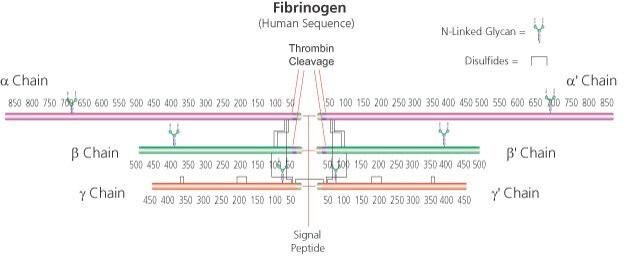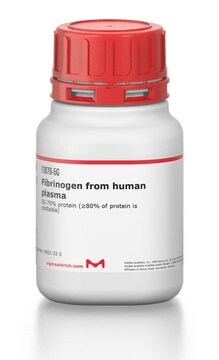추천 제품
생물학적 소스
mouse
Quality Level
결합
unconjugated
항체 형태
ascites fluid
항체 생산 유형
primary antibodies
클론
85D4, monoclonal
포함
15 mM sodium azide
종 반응성
pig, sheep, rabbit, bovine, baboon, human, goat, canine
기술
dot blot: suitable
indirect ELISA: 1:8,000
western blot: suitable
동형
IgG1
UniProt 수납 번호
배송 상태
dry ice
저장 온도
−20°C
타겟 번역 후 변형
unmodified
일반 설명
Fibrinogen is a blood coagulation protein that consists of Aα, Bβ and γ polypeptide chains. Fibrinogen expression is induced by acute-inflammatory responses and has also been associated with the risk of cardiovascular disorders. Monoclonal Anti-Fibrinogen antibody recognizes a conformational epitope, which is destroyed by the cleavage of the γ (302-303) bond. This epitope is found in fibrinogen and in fibrin monomers (devoid of either fibrinopeptide A, or both A and B fibrinopeptides), when they are immobilized on ELISA plates. The antibody reacts with the D-dimer and D-fragment. It does not recognize individual fibrinogen/fibrin chains in denatured-reduced forms or their proteolytic fragments. The E fragment is not recognized by the antibody. The antibody reacts with greater avidity with protofibrils than with wider fibrin fibers in electron microscopic analysis. Monoclonal Anti-Fibrinogen is specific for fibrinogen and fibrin in humans, baboons, bovines, sheep, goats, pigs, rabbits and dogs.
Fibrinogen was the first blood coagulation factor to be identified, and it is a precursor of fibrin protein. The three polypeptide chains are coded by three genes located on human chromosome 4q23-q32, and spans 51kb.
특이성
The product recognizes a conformational epitope, which is destroyed by the cleavage of the γ (302-303) bond. This epitope is found in both fibrinogen and in fibrin monomers, devoid of either fibrinopeptide A, or both A and B fibrinopeptides, when they are immobilized on ELISA plates. The antibody reacts with the D-dimer and D-fragment. It does not recognize individual fibrinogen/fibrin chains in the denatured-reduced form and their proteolytic fragments. The E fragment is not recognized by the antibody. Using electron microscopy, the antibody reacts with greater avidity with protofibrils than with wider fibrin fibers.
면역원
human fibrin degradation products
애플리케이션
Applications in which this antibody has been used successfully, and the associated peer-reviewed papers, are given below.
Immunofluorescence (1 paper)
Immunofluorescence (1 paper)
Monoclonal Anti-Fibrinogen antibody is suitable for use in indirect ELISA, dot blot (1:1000 using human fibrinogen), and western blot.
Monoclonal Anti-Fibrinogen antibody produced in mouse has been used in immunohistochemistry and confocal laser scanning microscopy.
생화학적/생리학적 작용
Fibrinogen is an acute-phase inflammatory protein, which plays an essential role in blood clotting.
면책조항
Unless otherwise stated in our catalog or other company documentation accompanying the product(s), our products are intended for research use only and are not to be used for any other purpose, which includes but is not limited to, unauthorized commercial uses, in vitro diagnostic uses, ex vivo or in vivo therapeutic uses or any type of consumption or application to humans or animals.
적합한 제품을 찾을 수 없으신가요?
당사의 제품 선택기 도구.을(를) 시도해 보세요.
Storage Class Code
10 - Combustible liquids
WGK
nwg
Flash Point (°F)
Not applicable
Flash Point (°C)
Not applicable
J Alfon et al.
Atherosclerosis, 145(2), 325-331 (1999-09-17)
HMG-CoA reductase inhibitors have been shown to be effective in primary and secondary prevention of coronary heart disease. Their mechanism of action is attributed to their cholesterol lowering activity but recent results seem to indicate additional effects related to the
Suttnar, J., et al.
Thrombosis and Haemostasis, 69, 1156-1156 (1993)
Dyr, J.E., et al. et al.
Thrombosis and Haemorrhagic Disorders, 166-171 (1989)
Laura Casani et al.
Thrombosis and haemostasis, 94(5), 1035-1041 (2005-12-21)
Inhibitors of 3-hydroxy-3-methylglutaryl coenzymeA reductase are widely used in the management and prevention of cardiovascular disease. In addition to its major activity, plasma lipid lowering, statins have shown a wide spectrum of additional effects that may contribute to their benefits
C M Adema et al.
Parasitology, 119 ( Pt 4), 395-404 (1999-12-03)
The planorbid snail Biomphalaria glabrata responded to exposure to either the compatible digenetic trematode Echinostoma paraensei or the incompatible species Echinostoma trivolvis by producing increased amounts of several distinctive plasma polypeptides. These polypeptides characteristically precipitated from plasma when mixed with
자사의 과학자팀은 생명 과학, 재료 과학, 화학 합성, 크로마토그래피, 분석 및 기타 많은 영역을 포함한 모든 과학 분야에 경험이 있습니다..
고객지원팀으로 연락바랍니다.